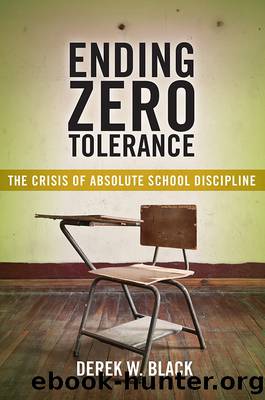Ending Zero Tolerance by Derek W. Black

Author:Derek W. Black [Black, Derek W.]
Language: eng
Format: epub
Tags: POL000000 Political Science / General
Publisher: New York University Press
Making Marginally Relevant Factors Determinative
One might still attempt to defend zero tolerance and harsh discipline on the basis that they still generally achieve some goal of the school, notwithstanding the inequitable treatment they produce. The problem with such a defense is that it glosses over why zero tolerance and harsh discipline wind up treating dissimilar students as though they were the same. They treat students the same because they are based on at least two fundamental logical fallacies, and those fallacies are the direct cause of random and arbitrary punishment, which goes to the very core of what due process was designed to prevent.
The first logical fallacy of treating dissimilar individuals the same is that it is premised on the notion that some characteristic or factor that is entirely irrelevant or only marginally relevant is actually of primary importance. For instance, both shovels and chainsaws have bladed tips and similar curvatures at their ends, but save for some very unique exigencies, choosing to dig a grave with a chainsaw or cut down a mature oak tree with a shovel would be irrational under almost any circumstance one would bother to imagine, even though one could theoretically dig a grave or cut down a tree with either. The items are too dissimilar in other meaningful respects to fashion a logic, under normal circumstances, by which to treat them the same. The logical fallacies were the premise that bladed tips were of importance to either project, when, in fact, some other characteristic was exponentially more important.
The same logic applies to persons. Is there a logic under which a university should interview both the PhD student and a sixth grader to teach a seminar on Mark Twain simply because both attest they are good communicators, have read Tom Sawyer and Adventures of Huckleberry Finn, and have earned the highest grade in every English course they have taken? Certainly, all those characteristics bear relevance to teaching in an English department, but they have no determinative importance within the pool of persons reasonably qualified for the job. Likewise, is there a logic by which the PhD student should be allowed to compete against the sixth grader in the public libraryâs summer reading-comprehension challenge for students simply because the PhD student attends school and has the summer off?
While these policies and practices may appear to look at relevant factors, those factors are so overinclusive and simplistic that they do not further the governmentâs goal in any meaningfully rational way. When viewed in isolation, the factors become an irrational basis on which to make a decision. Simplistic or overinclusive factors can, at most, serve as triggering or sorting factors that require further inquiry of other determinative factors. But zero-tolerance and harsh-discipline policies elevate simplistic factors to primary or determinative importance: that an item with a sharp edge on it was found on or near a student, that a student possessed an item that contains a pharmacological substance (which may mean nothing more than that it can be
Download
This site does not store any files on its server. We only index and link to content provided by other sites. Please contact the content providers to delete copyright contents if any and email us, we'll remove relevant links or contents immediately.
| Air & Space | Construction |
| Disability | Educational Law & Legislation |
| Labor Law | Maritime |
| Military | Personal Injury |
| Sports |
Steroids: History, Science, and Issues by Standora Joan E.; Bogomolnik Alex; Slugocki Malgorzata(1196)
A Practical Guide to International Arbitration in London by Hilary Heilbron(1085)
Adrift by Steven Callahan(1035)
Reclaiming History by Vincent Bugliosi(1023)
Persuasion by Owner(1018)
The Nuremberg Interviews by Leon Goldensohn(992)
Dog Company: A True Story of American Soldiers Abandoned by Their High Command by Lynn Vincent & Roger Hill(980)
40 Days and 40 Nights by Matthew Chapman(971)
Poisoned by Jeff Benedict(961)
Last Narco by Beith Malcolm(938)
The New Whistleblower's Handbook by Stephen Kohn(922)
Introduction to the study and practice of law in a nutshell by Kenney F. Hegland(898)
Kafka's Last Trial by Benjamin Balint(851)
Lincoln's Code by John Fabian Witt(848)
A Passing Fury by A. T. Williams(827)
Japanese War Crimes during World War II: Atrocity and the Psychology of Collective Violence by Frank Jacob(813)
Eichmann in Jerusalem by Hannah Arendt(803)
Dog Company: A True Story of American Soldiers Abandoned by Their High Command by Roger Hill & Lynn Vincent(796)
A Court of Refuge by Ginger Lerner-Wren & Rebecca A. Eckland(787)
